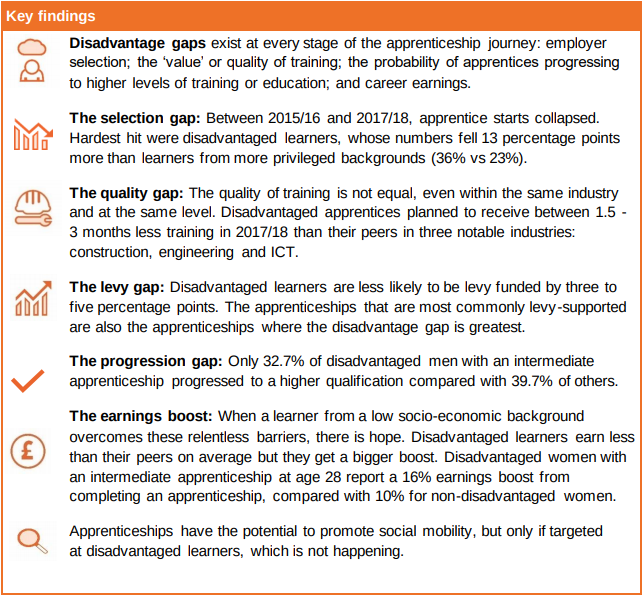The Social Mobility Commission has produced a report called ‘Apprenticeships and social mobility: fulfilling potential’. The report analyses the English apprentice system in terms of its contribution or hinderance of social mobility. The report used datasets to follow apprentices through their training until they qualified and entered the labour market. You can read a full copy of the report here.
What is social mobility and who are The Social Mobility Commission?
Social mobility is the link between a person’s job and income and the job and income of their parents. Where there is a strong link, there is a lower level of social mobility. Where there is a weak link, there is a higher level of social mobility.
The Social Mobility Commission monitors progress towards improving social mobility in the UK, and promotes social mobility in England. It is an organisation created by an act of Parliament inline with the 2016 Welfare Reform Act. You can find out more here on the social mobility commission’s gov.uk page.
Apprenticeships and social mobility: fulfilling potential
The Social Mobility Commission has produced a report that analyses the English apprenticeship system in terms of its contribution or hinderance of social mobility. The report used datasets to follow apprentices through their training until they qualified and entered the labour market.
The report evaluates whether the apprenticeship system in the UK is fair and effective -that means it is inclusive of all socio-economic backgrounds. Using a range of datasets, the report compares the following against non-disadvantaged peers and whether changes are a result of recent reforms to the apprenticeship system:
- accessibility of apprenticeship programmes to individuals from disadvantaged socio-economic backgrounds
- the type of training disadvantaged apprentices receive in terms of level, subject and planned duration.
- the chance of disadvantaged apprentices completing an apprenticeship or progressing into further and higher education
The report investigates whether apprenticeships are as effective as the evidence says they can be at increasing social mobility. It seeks to understand how reforms to the apprenticeship system and the introduction of the apprenticeship levy have reduced labour market gaps between disadvantaged and non-disadvantaged learners.
Key Findings
Recommendations
The Social Mobility Commission propose a set of targets for the Government to meet by December 2023. The targets do account for the difficulties arising from the pandemic.
Target 1: increase the share of apprentices from disadvantaged socio-economic backgrounds to pre-levy level.
Target 2:increase the proportion of starters from disadvantaged backgrounds at advanced and higher levels to match currently prevailing for non-disadvantaged apprentices.
Target 3: eliminate the disadvantage gap in levy support for starters at higher level.
Target 4: ensure apprenticeship programmes are at least as long for disadvantaged learners as for non-disadvantaged learners and stop the shortening of planned duration.
Target 5: reduce incidence of non-achievement for all regardless of socio-economic background and match non-achievement levels seen in other education sectors.
Target 6:ensure completion rates for apprenticeship programmes are the same for all regardless of socio-economic background and match completion levels seen in other education sectors.
Our views and commentary
Apprenticeships have the ability to unlock the potential of all young people and are widely acknowledged as one of the best mechanisms for increasing social mobility. However, we know that apprenticeships are not being targeted at those who need them the most and this has greatly reduced the positive impacts for young people. Since the introduction of the apprenticeship levy in 2017, workplace training for young people has actually fallen as more senior and more experienced colleagues take up training vacancies to further their careers. The 2020 Youth Voice Census tells us that 35% of respondents could not find an apprenticeship in their local area that was at the right level for them. This is concerning for young people who have told us that transport costs already provide a barrier to working outside of their area: 28% of young women and 21% of young men rated costs of public transport as bad in the youth voice census 2020.
Further to this, vulnerable groups of young people are being left out and it is clear action must be taken to further reform apprenticeships. For example, 19% of respondents with additional needs had also never had apprenticeship discussed with them. We see the same within minority groups, with 33% of black respondents have never had apprenticeships discussed with them, almost 3 times higher than their white counterparts (13%).
We strongly believe that apprenticeships have the potential to do great things for young people and the labour market in the UK, but the inequity within the system needs addressing, and quickly. We would recommend apprenticeship employers consider their responsibility to good youth employment practice, we will be launching a clear set of principles in the coming weeks that support employers to attract, recruit, retain and develop young people, highlighting what good practice looks like for engaging protected groups.













